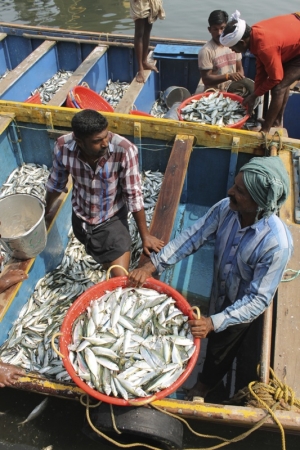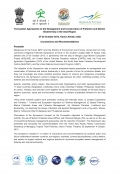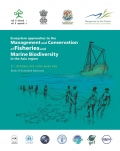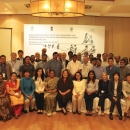Regional partners endorse ecosystem approach to fisheries management
Location: Kerala, India. 27th Oct 2013
Discussions at the symposium focused on the Ecosystem Approach to Fisheries Management (EAFM), the use of Marine Protected Areas (MPAs) and Fisheries Refugia (FR), as well as on the use of conventional fisheries management approaches and bycatch reduction devices. The symposium also presented the recommendations from the recent Asia Pacific Fishery Commission workshop on managing tropical trawl fisheries, held in Phuket, Thailand, 30 September- 4 October, 2013.
The Regional Fisheries Symposium resulted in a number of conclusions and recommendations (see related document on this page) for practical action and future collaboration between countries, sub-regions, scientists, community practitioners, policy makers, and sectors to support national and regional policies for improved ecosystem based management of fisheries and marine biodiversity.
The main conclusion of regional partners was to recognize the Ecosystem Approach to Fisheries Management (EAFM) as a practical way to address the twin objectives of fisheries sustainability and marine biodiversity conservation in coastal and offshore areas. They also agreed that EAFM should be a part of a holistic integrated coastal management approach.
Regional partners also endorsed the concept of Fisheries Refugia (FR), which offers a complementary management approach to traditional MPA management and involve the identification and designation of priority areas within which to integrate fisheries and habitat management objectives. The Fisheries Refugia approach is being tested in a number of countries in South East Asia and offer a good model for further learning and replication and or piloting across Asia and especially in South Asia,
The symposium drafted thirteen recommendations that covered action points on sound management principles; economic justification; enabling policies and safeguards; research, communication, and information management; and regional cooperation.
The regional partnerships established during the Symposium are maintained for continued collaboration and sharing on ecosystem management approaches for fisheries and marine biodiversity conservation.
A copy of the “Conclusions and Recommendations” is available on the MFF website and will be part of the Symposium Proceedings.

Fishers ponder the day's catch, Kerala, India © MFF, 2013
Related Documents

Ecosystem Approaches to Management and Conservation of Fisheries and Marine Biodiversity in the Asia Region
Conclusions and Recommendations
Author: MFF, UNEP, FAO APFIC, BOBLME GEF, SEAFDEC, CMFRI, MoE-Government of India
Publisher: MFF
Posted on: 14th Jan 2014
Category:
Size: 598 KB

Ecosystem approaches to the Management and Conservation of Fisheries and Marine Biodiversity in the Asia Region
27-30 October 2013 Cochin, Kerala, India
Author: MFF (Editor)
Publisher: MFF; CMFRI
Posted on: 7th Feb 2014
Category:
Size: 3.2 MB

